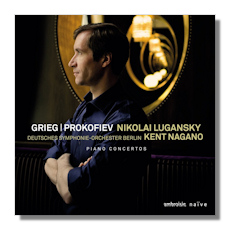
The Internet's Premier Classical Music Source
Related Links
-
Grieg Reviews
Prokofieff Reviews - Latest Reviews
- More Reviews
-
By Composer
-
Collections
DVD & Blu-ray
Books
Concert Reviews
Articles/Interviews
Software
Audio
Search Amazon
Recommended Links
Site News
 CD Review
CD Review
Romantic Piano Concertos

- Edvard Grieg: Piano Concerto in A minor, Op. 16
- Serge Prokofieff: Piano Concerto #3 in C Major, Op. 26
Nikolai Lugansky, piano
Deutsches Symphonie-Orchester Berlin/Kent Nagano
Ambroisie/Naïve AM210 59m
The Grieg Piano Concerto gets a lush, Romantic treatment from Lugansky and Nagano: tempos are relaxed, dynamics often favor restraint, harmonies blend warmly but never disruptively, and detail emerges clearly but with edges sanded. Pianist and conductor seem to be of one mind in milking the lyricism for all its beauty and exotic appeal. Lugansky plays the opening chords forcefully with an almost Brahmsian plangency as he reaches the bass regions. The orchestra states the main theme in a relaxed tempo and then Lugansky seconds the expansive approach but with an elegant, subtle rendering of the melody. The alternate theme here sounds quite melancholy and lovely, calling to mind the long Norwegian nights. Lugansky delivers a splendid account of the cadenza, and the second movement is beautifully and sensitively played by both pianist and orchestra. The finale's main theme is given a lively and spirited treatment by Lugansky, while he imparts a meltingly luxurious lyrical character to the lovely alternate theme. All in all, this is a strong performance that may well stand with classic efforts by Fleisher (who had a quite different approach), Richter and others.
The Prokofiev Third is appropriately livelier in both tempo and character. That said, it is hardly what one would describe as driven and heated in its interpretive approach, staking out territory closer in spirit to Cliburn/Hendl than to Argerich/Abaddo or Janis/Kondrashin. Lugansky's is a centrist reading, with reasonably quick tempos in livelier sections and more expansive ones in lyrical passages. But what sets his rendition apart from many other traversals of this warhorse is the dynamic character of his playing: the big racing chordal section that comes after the main theme is heard in the first movement exposition comes across with power and thrust, and the buildup leading to the return of the main theme brims with excitement in Lugansky's breathless pacing and digital clarity. The second movement variations are played with great sensitivity to their individual character: note the tasteful delicacy in Lugansky's dynamics in the first variation and their incisive vehemence in the third. In the fourth variation, the music's mystery and darkness emerge convincingly and the closing variation is brilliant in its vibrancy and fast pacing. The finale is lively and spirited in the outer sections and somewhat subdued in the middle section, with the big theme soaring in serenity rather than in ecstasy. All in all, this is a fine account of the Prokofiev Third, among the better renditions in the last decade or so. I also reviewed the Lang Lang Prokofiev Third in this update and found it quite exciting and interpretively a risk-taking affair. In many ways this account by Lugansky is the opposite in spirit: it's a refined, rather centrist but muscular and thoroughly persuasive take on this colorful and masterful work. Some will prefer more galvanic accounts, like the Lang Lang or Janis, but this one by Lugansky is convincing on its own somewhat more modest and tasteful terms.
The Deutsches Symphonie Orchester perform splendidly in both concertos and, as suggested above, Kent Nagano leads them with a masterful hand. The sound reproduction is vivid and powerful. For listeners interested in more subtle and measured approaches to these works, this disc should prove of great interest.
Copyright © 2013, Robert Cummings


















